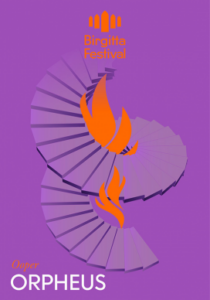Thursday, 01.08.2024 at 19:00
Ruins of the Pirita Convent, Tallinn
Tickets: 40.- / 50.- / 60.- / 99.-BuyFriday, 02.08.2024 at 19:00
Ruins of the Pirita Convent, Tallinn
Tickets: 40.- / 50.- / 60.- / 99.-Buy
Composer Claudio Monteverdi
Libretto by Alessandro Striggio
Arranged by Andrew Lawrence-King
Artistic director Andrew Lawrence-King
Choreographer and co-stage designer Tanja Skok
Assistant music director Xavier Diaz-Latorre
Set design and costumes Reili Evart
Light designer Priidu Adlas
Estonian Philharmonic Chamber Choir
Tallinn Baroque Orchestra
La Musica (Lady Music) Anna Piroli
Orfeo (Orpheus) Francisco Fernández-Rueda
Euridice (Eurydice) Marta Paklar
Silvia, la Messaggera (Messenger) Iris Oja
Imeneo (Hymenaios) Krõõt Arna (OMAtsirkus)
Ninfa (Nymph) Anete Peäske
Apollo (Apollo) Rasmus Kull (Theater Vanemuine)
Plutone (Pluto) Kristjan-Jaanek Mölder (Estonian Philharmonic Chamber Choir)
Speranza (Hope) Susanna Paabumets
Caronte (Charon) Henry Tiisma (Estonian Philharmonic Chamber Choir)
Proserpina (Persephone) Anna Piroli
Baccanti (Maenads) Marta Paklar, Anete Peäske, Susanna Paabumets, Iris Oja
Bacco (Bacchus) Tõnn Lamp
Dancers Elina Kuusma, Eric Istal, Helle-Maria Mitt, Tiina Karm, Katre Merilaid, Marko Reitalu
Shepherds Toomas Tohert, Raul Mikson, Kaarel Telgmaa, Danila Frantou, Kristjan-Jaanek Mölder (all Estonian Philharmonic Chamber Choir)
Spirits of Hell Rainer Vilu, Miguel Gonçalves Silva (both Estonian Philharmonic Chamber Choir)
Orpheus portrays two contrasting landscapes: on one hand, a serene and pastoral wedding that unites two lovers, and on the other hand, the dark and somber underworld of god Hades. The opera explores themes of immense grief, faithful love, and the extraordinary power of music. Orpheus, a masterful musician, mesmerizes listeners with his music and song, whether mortal or divine. Music flows through Orpheus’s character, both when he feels strong and when he loses his composure, embarking on a journey to the underworld.
Orpheus’s mythical journey spirals from celestial spheres through earthly seasons to the circles of hell.
Monteverdi’s 1609 score and Striggio’s 1607 libretto offer two different endings for the opera: either Apollo saves Orpheus or furious maenads kill him.
This opera allows you to travel back four centuries to Italy’s Baroque era, experiencing its sights, sounds, and emotions in an authentic production presented at the Birgitta Festival.
The opera lasts approximately 2 hours and 15 minutes, with one intermission.
The producer: Birgitta Festival